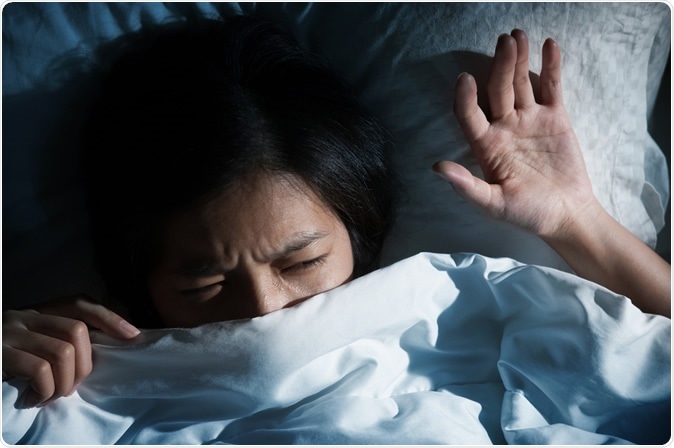A team of Netherlands Institute for Neuroscience researchers have found that a restful night with good REM (Rapid Eye Movement) sleep could counteract the effects of unpleasant experiences and memories. They have found the reason behind such an adaptation. Their study titled, “Restless REM sleep impedes overnight amygdale adaptation,” was published in the latest issue of the journal Current Biology.

Image Credit: Eggeegg / Shutterstock
The team of researchers conclude that emotional experiences often trigger “amygdala activation.” Unpleasant experiences evoke emotional distress in all individuals. This triggers the circuits of brain mainly in the “limbic system”. Several studies have shown that sleep helps to recover from this distress. Hence, sleep might produce a “time window” for reorganization of these activated circuits.
Their study noted that having a night with good amount of REM sleep can help the amygdala adaptation overnight. Having good quality slow wave sleep or NREM sleep preceding the REM sleep also facilitates adaptation of the limbic system. When REM sleep is disturbed or restless, the team writes, there is a failure in amygdala adaptation.
The researchers explain that having a restless REM sleep is characteristic of several psychiatric disorders including insomnia and post traumatic stress disorders. This could be, they write, due to “insufficient silencing of the locus coeruleus (LC) during REM sleep.” This insufficient silencing of the LC is responsible for insufficient recovery of the brain after a restful night of sleep. The team wrote that the amygdale is the “siren of the brain”. Its subsequent inhibition during restful REM sleep is responsible for dissolution of distress. This means that the person regains normalcy after an unpleasant experience due to the adaptation of the amygdala.
To investigate their hypothesis, the team included 29 participants to study the impact of an unpleasant emotional experience on REM sleep and limbic response using functional magnetic resonance imaging (fMRI). These participants varied in their severity of insomnia. Arousal and pattern of sleep was assessed using electroencephalography (EEG). The purpose was to assess whether the activity of the amygdala was related to restful REM sleep and whether reorganization of amygdala activity was impeded by sleep interruptions.
The team found that the reactivity of the amygdala reduced overnight when there was a decrease in the total REM sleep. They write, “Restless REM sleep impeded overnight amygdala adaptation.”
As a next step the team used smells or odours that were tagged to unpleasant emotional experiences. These smells were targeted to trigger the unpleasant memories and reduce the REM sleep. Results showed that good REM indeed was responsible for amygdala adaptation. The team wrote, “a maladaptive type of sleep” could be “target for interventions in mental disorders characterized by restless REM sleep.”
For their smell experiment the team used a specific smell along with an upsetting memory. As soon as the participant smelled that odour, he or she showed activity in the brain scans in the region of the amygdala. Then they spent the night sleeping in the sleep labs and an EEG measured their brain waves. Brain waves are typical of different phases of sleep. While sleeping they were again exposed to that smell. Next morning in an awake state the same unpleasant experience was presented again. This time the brain had adapted overnight among those with good REM sleep. This meant that they did not respond to the unpleasant experiences again. Some of the participants were restless sleepers. Among them there was no recovery of the amygdala at night when these people were exposed to the smell and experience again, they experienced distress again. This proved that it was the restful REM sleep that helps the brain circuits to recover overnight.
The team wrote that some of the neuronal connections related to a pleasant or unpleasant memory during the day could be strengthened or weakened during the night’s sleep. This was disrupted as well if the sleep was restless.
According to study researchers Rick Wassing, Frans Schalkwijk and Eus van Someren, diagnosing restless REM and targeting this phase of the sleep could help patients with insomnia and PTSD and also help them process unpleasant experiences in a better manner.
The authors wrote, “REM sleep can support overnight regulation of amygdala reactivity. The effect increases with longer preceding episodes of transition to REM but is impeded by REM sleep interruptions.” They add that people with PTSD or “early childhood adversity” could have chronic restless REM. They conclude, “Addressing overnight emotional memory processing deficits in these disorders is likely to provide clues to the mechanisms underlying hyperarousal, which have so far remained enigmatic.”
Journal reference:
Restless REM Sleep Impedes Overnight Amygdala Adaptation, Rick Wassing, Oti Lakbila-Kamal, Jennifer R. Ramautar, Diederick Stoffers, Frans Schalkwijk, Eus J.W. Van Someren, DOI: https://doi.org/10.1016/j.cub.2019.06.034, https://www.cell.com/current-biology/fulltext/S0960-9822(19)30761-4